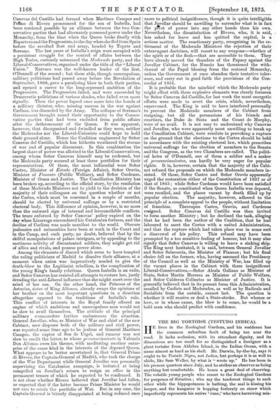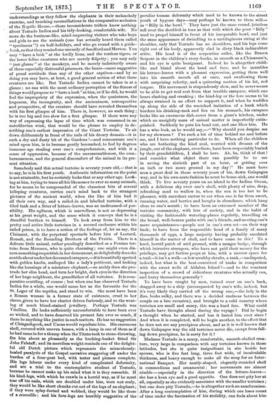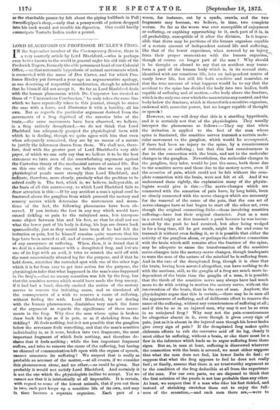THE BIG TORTOISE (TESTUDO INDICA).
FIE lives in the Zoological Gardens, and his residence has the common suburban fault of being too near the road. It lacks seclusion, with its attendant dignity, and its dimensions are too small for so distinguished a foreigner as a giant tortoise from Aldabra Island, in the Indian Ocean, with a name almost as hard as his shell. Mr. Darwin, by-the-by, says it ought to be Testddo Nigra, not Indica, but perhaps it is as well to abide, like Sam Weller, by what is "wrote up." He has been in his present quarters since July, and he strikes an observer as being anything but comfortable. He bears a great deal of observing. The volatile young people who resort to the Zoological Gardens for purposes of flirtation ; who say the tenderest things to each other while the hippopotamus is bathing, the seal is kissing his keeper, and the kangaroo is hopping forlornly on straw which imperfectly represents his native ' runs ;' who have harrowing mis- understandings NI they follow the elephants in their melancholy exercise, and touching reconciliations in the comparative seclusion of the Reptile House,—these inconsiderate triflers know nothing about Testudo Indica and his tidy-looking, comfortable wife. No more do the business-like, mind-improving visitors who take boys
and girls to see the animals (one has actually heard them called " specimens "!) on half-holidays, and who go round with a guide- Jraok, so that they remind one uneasily of Sandford and Merton. You may "have a look" at the lordly lions, and the restless tigers, or the lower feline creatures who are merely fidgetty ; you may only "just glance" at the monkeys, and be merely indistinctly aware of those especially distressful prisoners, the bears—more suggestive of penal servitude than any of the other captives—and by so doing you may have, at least, a good general notion of what these creatures are like. But Testudo Indica cannot be taken in at a glance ; no one with the most ordinary perception of the fitness of things would propose to "have a look" at him, or if he did, he would feel the impropriety of the expression, when the quaintness, the hugeness, the incongruity, and the ancientness, retrospective and prospective, of the creature should have revealed themselves with his first glimpse of him. There is, however, no such thing ; he is too big and too slow for a first glimpse. If there were any way of expressing the lapse of time which was consumed in an antediluvian wink, that would be the phrase to employ in de- scribing one's earliest impression of the Giant Tortoise. To sit down deliberately in front of the rails of his dreary domain—it is such a dry and dusty bit of the Gardens !—and concentrate one's mind upon him, is to become gently benumbed, to feel by degrees immense age stealing over one's comprehension, and with it a sense of oppression, because of the unreasonableness, the cum- bersomeness, and the general discomfort of the animal in its pre- sent situation.
Somebody said this actual tortoise is seventy years old,—that is to say, he is in his first youth. Authentic information on the point is not attainable, but he certainly looks that or any other age. Look- ing at him, trying to trace all his likenesses to ever so many animals, for he seems to be compounded of the clumsiest bits of several lolloping creatures, carries one's mind back to the strangest pictures of the ancient world, when the like of him had it all their own way, and a railed-in and labelled tortoise, with a tiled tank and a litter of lettuce-leaves, was an undreamed-of pos- sibility. His ugliness, which is marvellous, is not so depressing as his great weight, and the sense which it conveys that he is a dreadful burthen to himself. To look away from him to the pretty and active little tortoises in a second enclosure within his railed prison, is to have a notion of the feelings of, let us say, the Claimant, with the perpetual spectacle before him of Leotard, Romah, and the Bounding Brothers of the Prairie. There is a delicate little animal, rather puzzlingly described as a Persian tor- toise from Morocco, who is quite charming ; one might even dis- cern something coquettish in her demeanour, so delightfully does she sc uttle about under her decorated carapace,—it is beautifully spotted with golden knobs, scalloped like a lady's petticoat, and looking like the housings of a miniature elephant,--80 archly does she pro- trude her slim head, and turn her bright, dark eyes in the direction of her huge neighbour, the grandfather of all tortoises. It is com- parative scuttling, of course ; but when one has observed Testudo Indica for a while, one would name her as the favourite for the St. Leger of the reptiles, and stand to win. She must have been a Roman woman in a former state of existence, cruel to her slaves, given to have her chariot driven furiously, and to the wear- ing of much blood-stained jewellery. Perhaps Testudo was Vitellius. He looks sufficiently uncomfortable to have been ever so wicked, and to have deserved his present fate ever so much, if there be anything like justice in such matters. He has no suggestion of Chingachgook, and Uncas would repudiate him. His enormous shell, covered with uneven bosses, with a lump in one of them as if he had come in for a thump when the Titans took to stone-throwing, fits him about as pleasantly as the bucking-basket fitted Sir John Falstaff; and its merciless weight reminds one of the delight- ful old Dutch picture which represents the miraculously- healed paralytic of the Gospel narrative staggering off under the burden of a four-post bed, with tester and plumes complete.
His legs labour under every kind of complicated deformity, and are a trial to the contemplative student of Testudo, because he cannot make up his mind what it is they resemble. If his hind-legs, with which he crawls in a horrid way, as if he must tear off his nails, which are doubled under him, were not scaly, they would be hie short chunks cut out of the legs of an elephant; if they were splay-footed and webbed, they would be like those of a crocodile ; and his fore-legs are horribly suggestive of the peculiar human deformity which used to be known to the street youth of bygone days—may perhaps be known to them still— as "Billy in the bowl." They have just the same round, jointless roll over the doubled-in toes as that with which the poor "Billy" used to propel himself in front of his inseparable bowl, and just the same appearance of dwindling to a cartilaginous string at the shoulder, only that Testudo has no shoulders, and his legs come right out of his body, apparently clad in dirty black indiarubber attire. His head is of the serpentine order, like the Brazen Serpent in the children's story-books, as smooth as a Chinaman's, and his eye is quite benignant. Indeed he is altogether child- like and bland about the head and face, and he mumbles his lettuce-leaves with a pleasant expression, getting them well into his smooth mouth all at once, and swallowing them with surprising celerity, and a quivering motion of his fat, red tongue. His movement is stupendously slow, and he never seems to be able to get real rest from that terrible carapace, which one hears clashing and creaking ; the hind-leg or the fore seems to be always strained in an effort to support it, and when he waddles up along the side of the wretched imitation of a bank which borders his drinking-tank and lies on his stomach, his carapace looks like an enormous dish-cover from a giant's kitchen, under which an unsightly mass of animal matter is imperfectly extin- guished. Suddenly he puts his head out, and one likes him. He has a wise look, as he would say,—" Why should you despise me for my slowness ? I've such a lot of time behind me and before me, and I have nothing particular to do. When all the children who are bothering the kind soul, worried with dreams of the jungle, out of the elephant, over there, have been respectably buried by their grandchildren, I shall be here. Ah, ha, think of that ! and consider what object there can possibly be to me in saving the sixtieth part of an hour, or getting over an inch or two more ground in my day !" He must have seen a great deal in those seventy years of his, down Galapagos way, and in his own mute fashion he must be home-sick, one would think. To live seventy years on an island in the Indian Ocean, with a delicious sky over one's shell, with plenty of nice, deep, refreshing mud to wallow in, when the sun is too hot to be pleasant, with succulent cactus to eat when one is far from sweet, running water, and berries and boughs in abundance, which hang close to one's mouth ; to have been an esteemed member of the tortoise community, with lots of society, and in the habit of visiting the fashionable watering-places regularly, travelling on the broad, well-beaten paths with one's friends, and meeting one's mere acquaintances—people not in one's own set—on their way back; to have been the responsible head of a family of many thousands of eggs, a large majority having probably emulated himself in the matter of shell, and to have come to this ! To a hard, horrid patch of arid ground, with a meagre hedge, through which intrusive strangers, who have not paid their money for the privilege, may get furtive peeps at him, with a narrow space for
a trail—it isn't a walk—a few scrubby shrubs, a tank,—undisputed, indeed, but what is the best-contrived of tanks in comparison with the sweet wells of Aldabra Island ?—and to the constant inspection of a crowd of ridiculous creatures who actually run, and hurry themselves generally?
To have been caught by men, turned over on one's back, dragged away to a ship (accompanied by one's wife, indeed, but it's very likely they carried off the wrong one,—the lady in the Zoo, looks sulky, and there was a decided coolness between the couple on a late occasion), and brought to a cold country where tortoises are small and saucy, this was a hard fate. What could Testudo have thought about during the voyage ? Did he begin a thought when he started, and has it lasted him ever since ? And when it is completed, will he begin another, to the effect that he does not see any precipices about, and as it is well known that down Galapagos way the old tortoises never die, except from fall- ing down precipices, he is sorry for it ?
Madame Testudo is a saucy, comfortable, smooth-shelled crea- ture, very large in comparison with any tortoises known in these latitudes, but she is quite insignificant in size beside her spouse, who is five feet long, three feet wide, of incalculable thickness, and heavy enough to make all the soup for an Inter- national Banquet. Her neatly-shaped, elegantly-rounded shell is commodious and ornamental ; her movements are almost nimble—especially in the direction of the lettuce-leaves- she has a keen eye and a good appetite. One does not pity her at all, especially as she evidently associates with the smaller tortoises ; but one does pity Testudo,—he is altogether such an anachronism.
After a long contemplation of him, during which one loses count of time under the fascination of his stolidity, one feels about him
as the charitable passer-by felt about the piping bullfinch in Poll Sweedlepipes's shop,—only that a pennyworth of poison dropped into his tank would not trouble his digestion. One could hardly emancipate Testudo Indica under a pound.
































 Previous page
Previous page